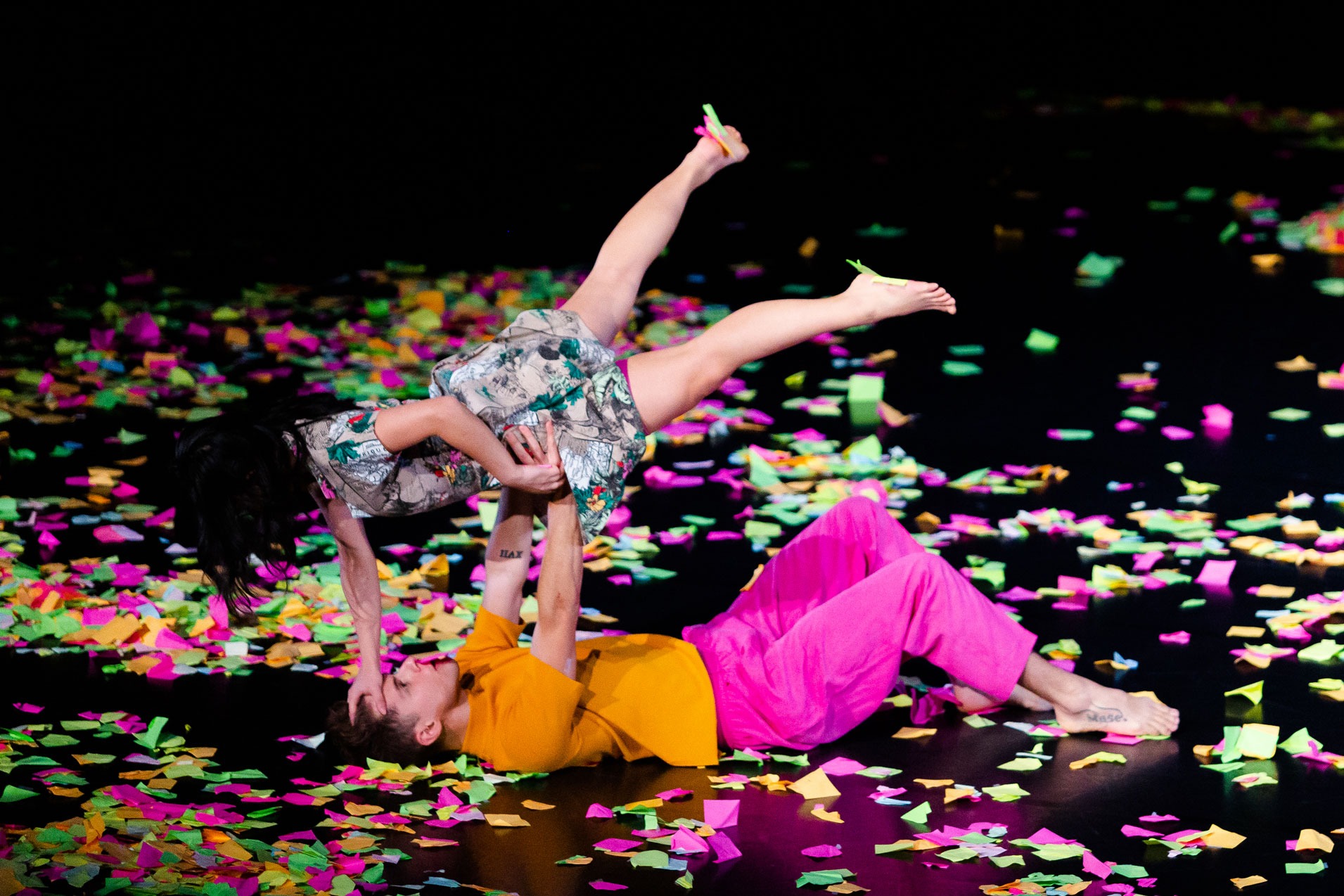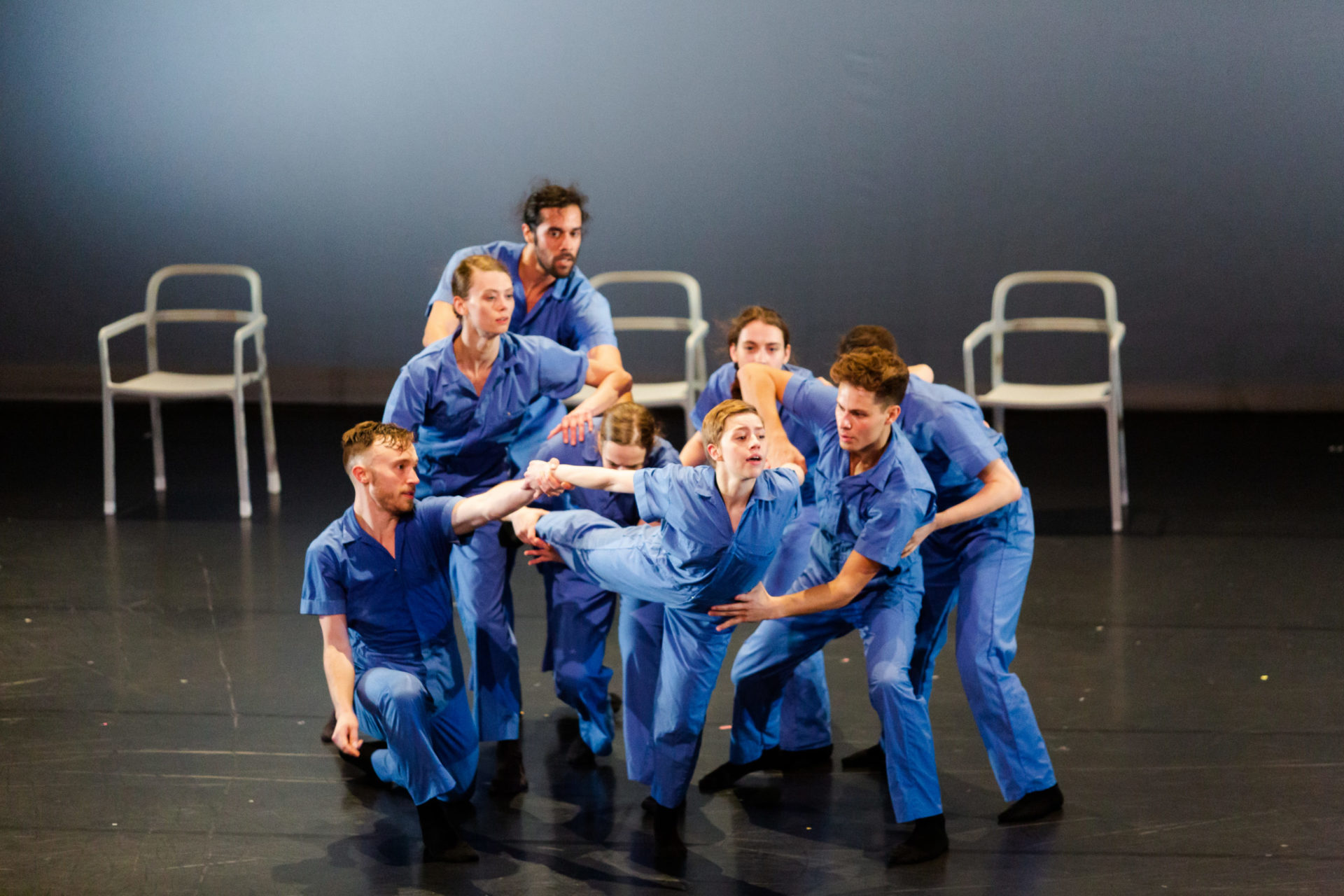At Oz Arts Nashville
New Dialect Performs Poignant Double Feature
Six amorphous figures appear on a dark stage as music fades in. The figures split into pairs and slow dance as the lights go up. It’s the kind of slow dance that you see in movies. The kind of movies where it takes an hour, a break up, and a triumph of the will before the two main characters, in a high school gymnasium turned Sadie Hawkins dance floor, realize that they were meant for one another. The girl rests her head on the guy’s chest as they share – if only for a moment- completeness. This is how First Fruit, Rosie Herrera’s new ballet, opens, the only caveat being that each of the characters are covered head-to-toe in Post-It notes.

Grants from the N.E.A., the Tennessee Arts Commission, Oz Arts, and the Danner Foundation made this world premier possible. In January of 2020 Herrera conducted a week long workshop with 67 participants from across the country. In the weeks following she collaborated with the dancers of New Dialect to create First Fruit; the the first of two works on New Dialect’s program last weekend at Oz Arts Nashville.
Warm and familiar-sounding Spanish music serves as a soundtrack while the neon squares of paper dance from the performers to the floor. Soon enough the stage, which had started black, is littered with bright colors. As layers shed from the dancers, bright street clothes and leotards are revealed. It is difficult, with a work of this nature, to nail down a specific and concrete meaning, but the performance is broken into roughly four main movements. Each scene seems to explore different endings to romantic relationships: heartbreak, drifting apart, abuse, and lasting love (in no particular order). One memorable scene features a female dancer who slowly and methodically rips a fallen post-it note to shreds. A male dancer, on the opposite end of the stage, writhes in agony with each motion. The end of each scene is heralded by the company rushing out and using a cardboard flap to cover a character (or characters) as they lay on the ground.
The integration of the post-it notes as costume, prop, and set is brilliant. The choreography itself is inventive in that it is always subservient to the narrative. The production runs a full gamut of emotion. It is quirky, sad, strange, beautiful, passionate, and mesmerizing.

The second production of the evening was The Triangle by Nashville Native and founder of New Dialect Banning Bouldin. This work, which played to sold out crowds last year, is a visceral and emotional study on our cultural obsession with overcoming. In a pre-event discussion she described this work’s unique creative process. Bouldin, a sufferer of relapsing-remitting multiple sclerosis, described her first attack as the catalyst for this work. “3 and a half years ago I experienced my first episode of MS. I spent the first 36 years of my life an advancedly coordinated, athletic, professional dancer… I woke up one morning unable to feel my legs. I had tremendous difficulty balancing and walking. It was a very scary time for me. I Remember crying when I was sitting in my car and realized I wasn’t going to be able to drive myself… and having the very reassuring thought that I don’t have to be able to walk and I don’t have to be able to dance to make dances”.
Bouldin’s experience with MS opened a line of questioning which led to the development of 13 short works that she calls “Limitation Etudes.” She describes The Triangle as a natural outgrowth of these ideas. Confinement and constraint play a major role throughout the work. It opens on an ensemble of dancers connected in a maze of straps. As one dancer escapes she does so at the expense of another. At times it is difficult to watch; paralysis is an uncomfortable thought. The dancers found themselves confined to chairs. They are limp and powerless as the hands of others drag them across the stage. They fall and struggle to get up, and that was the most moving part of The Triangle for me. However difficult it was, they never stopped striving to get up. The dance is an artistic statement about our societies’ romanticization of striving that resonates far beyond physical disabilities.
This stint of shows will launch New Dialect into a three year touring initiative of these productions. They were one of five Southeastern dance companies to be selected by SouthArts to participate in the program. These works will continue to have life and meaning in other towns and communities as New Dialect acts as a cultural diplomat for the Music City across the country.



